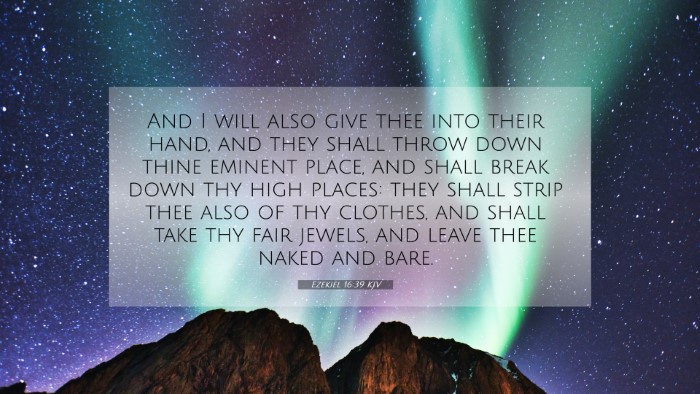Ezekiel 16:39 - Summary of Interpretations
Ezekiel 16:39 presents a powerful message regarding judgment and the consequences of unfaithfulness. The verse states:
"And I will give thee into their hand, and they shall throw down thy eminent place, and shall break down thy high places: they shall strip thee also of thy clothes, and shall take thy fair jewels, and leave thee naked and bare."
Context and Background
This verse is situated within a prophetic oracle against Jerusalem, utilizing the powerful metaphor of a bride betrayed by her husband. Ezekiel, often called the "watchman," portrays God's anguish and disappointment over Israel's infidelity with foreign entities and idolatry.
Commentary Insights
-
Matthew Henry:
Henry observes the symbolism in this verse as a depiction of divine judgment upon unfaithful Israel. He emphasizes that the stripping away of "clothes" and "jewels" signifies the loss of glory and honor due to sin, illustrating how sin leads to disgrace.
-
Albert Barnes:
Barnes interprets the act of being given into the hands of enemies as a divine decree allowing foreigners to execute God's judgment. He notes that this signifies not just physical captivity but a spiritual defeat, where Israel’s former glory is replaced by humiliation.
-
Adam Clarke:
Clarke adds depth to the historical context, linking the events to the eventual Babylonian captivity. He points out that God’s withdrawal of protection results in the humiliation of His people, demonstrating the severity of turning away from Him.
Thematic Connections
This verse draws upon themes of divine judgment, unfaithfulness, and restoration. The connections with other biblical texts can enhance understanding:
-
Cross Reference 1: Isaiah 3:17 - speaks of judgment leading to baldness and nakedness as a sign of disgrace.
-
Cross Reference 2: Jeremiah 13:26 - the stripping away of garments as a metaphor for shameful punishment.
-
Cross Reference 3: Hosea 2:3 - imagery of stripping away to leave the people bare as a warning against idolatry.
-
Cross Reference 4: Revelation 3:17 - underscores the spiritual blindness and need for repentance, paralleling themes of divine judgment.
-
Cross Reference 5: Luke 19:44 - prophetic lament over Jerusalem's imminent destruction when they fail to recognize their time of visitation.
-
Cross Reference 6: Matthew 23:38 - a cry reflecting Jesus’ mourning over the coming desolation of Jerusalem as a result of rejection.
-
Cross Reference 7: James 4:4 - equating friendship with the world to enmity with God, reinforcing the idea of unfaithfulness leading to dire consequences.
Understanding Through Cross-Referencing
The study of Ezekiel 16:39 reveals the importance of cross-referencing biblical texts to grasp the full weight of God's message. Understanding connections between this text and others can provide a comprehensive view of God's expectations and the repercussions of disobedience.
- Utilize a bible concordance to find relevant verses that echo similar themes.
- Engage with cross-reference Bible study techniques for deeper analysis.
- Explore the use of bible reference resources to identify interconnections comprehensively.
Practical Application
Believers are encouraged to reflect on the lessons of this verse:
- Recognize personal areas of unfaithfulness and seek restoration.
- Value the importance of staying steadfast in faith to avoid the consequences revealed in scripture.
- Encourage a community dialogue around the implications of spiritual fidelity and its impacts on communal life.
Conclusion
Ezekiel 16:39 serves as a poignant reminder of the severe consequences of turning away from God. Through comparative Bible verse analysis, one gains a fuller understanding of God's heart and His expectations of fidelity from His people. The inter-Biblical dialogue occurs across many texts, emphasizing the ongoing relevance of these themes throughout both the Old and New Testaments.












